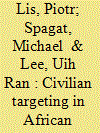|
|
|
Sort Order |
|
|
|
Items / Page
|
|
|
|
|
|
|
| Srl | Item |
| 1 |
ID:
083475


|
|
|
|
|
| Publication |
2008.
|
| Summary/Abstract |
Cluster sampling has recently been used to estimate the mortality in various conflicts around the world. The Burnham et al. study on Iraq employs a new variant of this cluster sampling methodology. The stated methodology of Burnham et al. is to (1) select a random main street, (2) choose a random cross street to this main street, and (3) select a random household on the cross street to start the process. The authors show that this new variant of the cluster sampling methodology can introduce an unexpected, yet substantial, bias into the resulting estimates, as such streets are a natural habitat for patrols, convoys, police stations, road-blocks, cafes, and street-markets. This bias comes about because the residents of households on cross-streets to the main streets are more likely to be exposed to violence than those living further away. Here, the authors develop a mathematical model to gauge the size of the bias and use the existing evidence to propose values for the parameters that underlie the model. The research suggests that the Burnham et al. study of conflict mortality in Iraq may represent a substantial overestimate of mortality. Indeed, the recently published Iraq Family Health Survey covered virtually the same time period as the Burnham et al. study, used census-based sampling techniques, and produced a central estimate for violent deaths that was one fourth of the Burnham et al. estimate. The authors provide a sensitivity analysis to help readers to tune their own judgements on the extent of this bias by varying the parameter values. Future progress on this subject would benefit from the release of high-resolution data by the authors of the Burnham et al. study.
|
|
|
|
|
|
|
|
|
|
|
|
|
|
|
|
| 2 |
ID:
182661


|
|
|
|
|
| Summary/Abstract |
Armed conflict actors frequently target civilian populations. Thus, an improved understanding of such behaviour could pave the way to reducing it. We use the Civilian Targeting Index (CTI) and a broad array of geo-referenced data to investigate the spatio-temporal and economic dynamics of civilian targeting by conflict actors in Africa. Two main insights are generated. First, the civilian targeting behaviour of African non-state conflict actors is strongly influenced by the behaviour of other proximate actors. In particular, non-state actors tend to increase their civilian targeting after nearby non-state actors have done so. Possible mechanisms to explain such spatial spillovers include emulation and retaliation. Second, a negative relationship between economic activity and civilian targeting exists and applies to both state and non-state actors. In addition, CTIs of non-state actors tend to increase with population density, the geographical spread of their conflict activity and conflict duration. State actors have higher average CTIs than non-state actors do, but the gap between the two actor types tends to close during long-duration conflicts.
|
|
|
|
|
|
|
|
|
|
|
|
|
|
|
|
| 3 |
ID:
062317


|
|
|
|
|
| Publication |
2005.
|
| Description |
p 131-152
|
| Summary/Abstract |
Álvaro Uribe assumed the presidency of Colombia on 7 August 2002, riding a wave of general dissatisfaction with the country’s increasingly violent conflict. Uribe’s ambitious plan to gain control over lawless territories and provide security to all sectors of society based on an expanded military and police presence and the creation of networks of civilian support has been controversial and has faced particularly fierce censure from human-rights organisations. Yet polemics have obscured some underlying facts about the conflict. It is possible to measure what is going on in terms of violent attacks, armed clashes, deaths and injuries. Such metrics, analysed rigorously, show incomplete but nonetheless unmistakable evidence that the Uribe government has had significant success in fighting the guerrillas while reducing civilian deaths.
|
|
|
|
|
|
|
|
|
|
|
|
|
|
|
|
| 4 |
ID:
092051


|
|
|
|
|
| Publication |
2009.
|
| Summary/Abstract |
In a much-cited recent article, Obermeyer, Murray, and Gakidou (2008a) examine estimates of wartime fatalities from injuries for thirteen countries. Their analysis poses a major challenge to the battle-death estimating methodology widely used by conflict researchers, engages with the controversy over whether war deaths have been increasing or decreasing in recent decades, and takes the debate over different approaches to battle-death estimation to a new level. In making their assessments, the authors compare war death reports extracted from World Health Organization (WHO) sibling survey data with the battle-death estimates for the same countries from the International Peace Research Institute, Oslo (PRIO). The analysis that leads to these conclusions is not compelling, however. Thus, while the authors argue that the PRIO estimates are too low by a factor of three, their comparison fails to compare like with like. Their assertion that there is "no evidence" to support the PRIO finding that war deaths have recently declined also fails. They ignore war-trend data for the periods after 1994 and before 1955, base their time trends on extrapolations from a biased convenience sample of only thirteen countries, and rely on an estimated constant that is statistically insignificant.
|
|
|
|
|
|
|
|
|
|
|
|
|
|
|
|
| 5 |
ID:
095038


|
|
|
|
|
| Publication |
2010.
|
| Summary/Abstract |
This paper considers the second Lancet survey of mortality in Iraq published in October 2006. It presents some evidence suggesting ethical violations to the survey's respondents including endangerment, privacy breaches and violations in obtaining informed consent. Breaches of minimal disclosure standards examined include non-disclosure of the survey's questionnaire, data-entry form, data matching anonymised interviewer identifications with households and sample design. The paper also presents some evidence relating to data fabrication and falsification, which falls into nine broad categories. This evidence suggests that this survey cannot be considered a reliable or valid contribution towards knowledge about the extent of mortality in Iraq since 2003.
|
|
|
|
|
|
|
|
|
|
|
|
|
|
|
|
| 6 |
ID:
105043


|
|
|
|
|
| Publication |
2011.
|
| Summary/Abstract |
I survey much evidence on mortality in Iraq, including data from the first and second Lancet surveys. The second Lancet survey is inconsistent with all credible and relevant information on levels and trends in violent deaths and on the geographical distribution of violence. I discuss weaknesses in attempts made by The Bloomberg School of Public Health and authors of the second Lancet survey to claim corroboration for the second Lancet survey from other sources. These attempts notwithstanding, the second Lancet survey is a clear outlier within a wide body of evidence on mortality in Iraq.
|
|
|
|
|
|
|
|
|
|
|
|
|
|
|
|
|
|
|
|
|